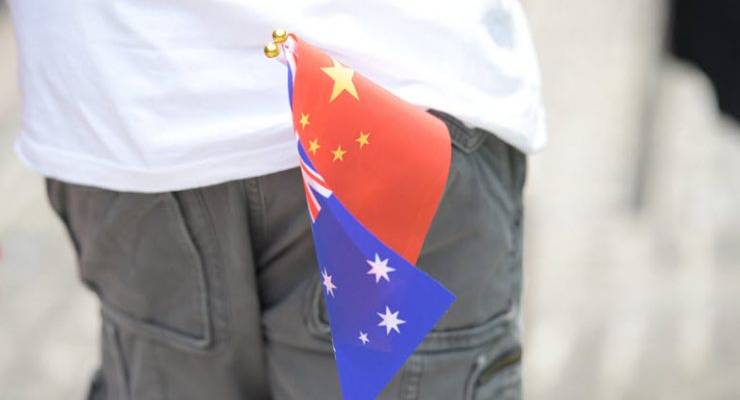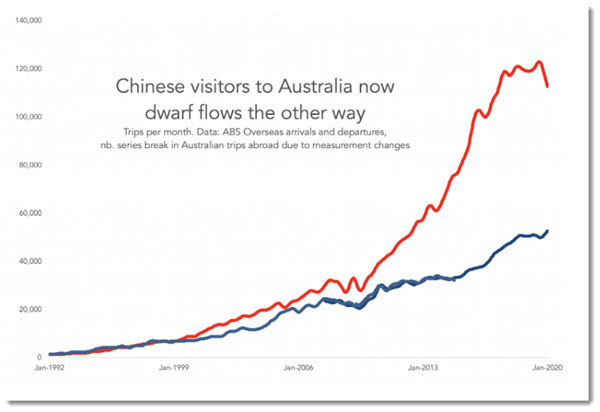
Are we enmeshed with China? Oh. Boy. Let us count the ways.
Anyone who wants to talk about reducing our reliance on China needs first to understand the breadth and depth of it. Our two countries are entangled, for better and for worse.
“This is the first time in our history that our dominant trading partner is not also our dominant security partner,” the then prime minister, Malcolm Turnbull, said in 2018. “We must see this as an opportunity not as a risk.”
Such either-or thinking is too black and white for thinking people. Plainly it is an opportunity and a risk, and we should admit as much.
China is not an ideal global citizen. It’s treatment of Taiwan, Hong Kong and the Uyghur people were all possible reasons to make our trade flows into a bargaining chip even before the pandemic came along. But are we in a position to bargain?
China is our biggest source of imports and our biggest destination for exports. This happened fast, and the trade flows — exports especially — grow bigger ever faster. Australia has ascended from the middle to the top of lists of wealthy countries in the past 20 years. China is why.

That is to a great extent a virtue of its sheer size. It consumes a lot, it produces a lot, and it needs a lot of inputs. We are happy to provide.
Any investor can tell you the merits of diversification. But it is not as if we’re resting all our economic hopes and dreams on one tiny tinpot nation. China is both vast and densely populated. It is also growing rich. These are the primary reasons for its enormous economic relevance to many countries.
Australia, meanwhile, is economically mid-sized which limits our strategic power in playing games with our trade flows.
Look at the following two graphs before assuming we should do as the United States has done and commence a trade war. The relationship is not an equal one: our relevance to China’s economy is less than its relevance to us.

As the next graph shows, Australia’s enormous volume of goods exported to China still makes us only its fifth biggest source country. And our prodigious consumption of Chinese products is even less impressive — as a destination for Chinese goods we are not even in the top dozen.

Our goods imports from China are diverse: phones and electronics, clothes and shoes, machines and other industrial goods. But our goods exports to China are monolithic: iron ore, gas, coal.
Commodity markets, like the market for iron ore, can reroute after a trade dispute. Our coal goes somewhere else and another nation’s coal goes to China. That’s the nature of a commodity.
But markets for complex goods are not like that. Without Chinese-manufactured goods, we’d find life substantially more difficult.
Foreign investment
China has been the biggest source of foreign investment in Australia for five of the past six years. That money is not just buying property — it is also helping build it. It’s not just buying up milk powder — it’s helping make it. It’s not just buying beef but owning the companies that grow cattle.
Foreign investment makes us better off. Whether we’re talking about the Hilton or Aldi, foreign firms with deep pockets and well-developed know-how add diversity to Australia’s economy. Without China’s foreign direct investment, Australia’s economy would be weaker, less vital.
People
Australia’s exports to China are not just in goods.
Even greater in raw numbers than the impressive volume of students is the number of tourists. Australian tourism in China has grown in a linear fashion, but Chinese tourism to Australia has grown exponentially, as the next graph shows.

That’s been a fat earner for the hotels of Sydney and the boats that sail out of Cairns. Many tourists are also parents visiting their progeny who are enrolled in classes here. Tourism exports and education exports have big synergies.
As any first year accounting lecturer knows, the universities of this nation are propped up by Chinese students, more than 200,000 of them in 2019. They pay up to $40,000 a year for the privilege and prestige of a Western education.
The money is nice. Education exports count to Australia’s GDP. But that kind of linkage is also important because it comes with feeling, feeling that infinite terajoules of natural gas will never provide.
Chinese students who have spent time in Australia and returned home are a group more inclined to return, more inclined to trade with Australia, and also a political bloc disinclined to knee-jerk antagonism of Australia.
We need blocs like that on both sides of this relationship.
Does Australia need to rethink its economic relationship with China? Let us know your thoughts at letters@crikey.com.au. Please include your full name if you would like to be considered for publication.









Yes, Australia does have a good trading relationship with China, although in a number of ways we should be less dependent, so we are better able to manage our health system and defence. Our main problem is that we have no reason In terms of our national interests to be hostile to China, as the US seems to want us to be. Yes, we have issues with how authoritarian it’s government is, it’s claims in the South China Sea, and it’s record on human rights. If it’s good enough to treat Saudi Arabia, another member of the G20, as a friendly power, although it’s government is more authoritarian than China’s, it denies human rights to women and to people of other religious faiths, and it engages in aggression for influence against Iran, then we don’t need to confront China, as the US wants.
Australia will never be truly grownup until it becomes non-aligned, being a vassal state is demeaning and like all vassal states they are dispensed with when no longer needed. New Zealand is way ahead of Australia in this regard.
Excellent article. A well-respected Australian Economist accurately noted many years ago now that if China holds up then Australia is fine, but if it doesn’t ‘we’re buggered’. Never has that been truer than now.
I make a deliberate point of buying my stuff from Taiwan or South Korea or Indonesia or Vietnam or Thailand or Japan and avoiding, where possible, mainland China. I dislike and distrust the government of China. I am sure that individual Chinese, like people everywhere, are just fine. But it does worry me that so many are so ready to accept the propaganda that they are fed from their government. But then, I suppose, the same is true of Australians.
Great article. There are so many dimensions to the relationship with China.